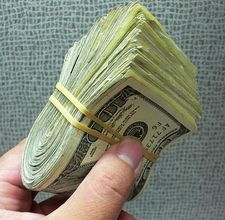Corporate lobby targets African-Americans for NC bill raising loan interest rates
 North Carolina has some of the most stringent consumer protection rules in the country against predatory lending. In 2010, lending groups ramped up campaign contributions [pdf] to elect lawmakers more hospitable to their interests, and are now pushing a bill that would allow lenders to raise the interest rates they charge on consumer loans -- and reaching out to African-American voters who would be among those most affected by the measure.
North Carolina has some of the most stringent consumer protection rules in the country against predatory lending. In 2010, lending groups ramped up campaign contributions [pdf] to elect lawmakers more hospitable to their interests, and are now pushing a bill that would allow lenders to raise the interest rates they charge on consumer loans -- and reaching out to African-American voters who would be among those most affected by the measure.This week, Americans for Prosperity North Carolina, the conservative advocacy group heavily backed by N.C. retail magnate Art Pope, rolled out a robo-call campaign targeting black districts in North Carolina to garner support for House Bill 810.
On Memorial Day my house received the automated call, which features a woman who is apparently African-American and identifies as "Joan with Americans for Prosperity North Carolina." "Joan" asked me to call Rep. Winkie Wilkins (incorrectly; Wilkins isn't my representative), a Democrat representing a heavily African-American district in Durham and Person counties, and tell him to support the industry-backed measure.
Listen to audio of the Americans for Prosperity robo-call here.
The call says the bill is essential for "hometown lenders" and to increase credit access for "small business and families." But nowhere does it mention why financial interests are pushing it: because it increases from 25 percent to 36 percent the amount of interest lenders can charge consumers on small loans, allows for new fees, and other measures that boost lender profits.
The N.C. Commissioner of Banks has gone on record saying that current consumer loan rates -- which go up to 54 percent -- are high enough to deliver a healthy profit to lenders. The Center for Responsible Lending finds that the added interest would strip $50 million to $70 million away from North Carolina consumers -- disproportionately in low-income and African-American communities.
And despite the robo-call's claim about "hometown lenders," the Center also finds that two-thirds of this profit windfall would flow to CitiFinancial and
Tags
Chris Kromm
Chris Kromm is executive director of the Institute for Southern Studies and publisher of the Institute's online magazine, Facing South.
